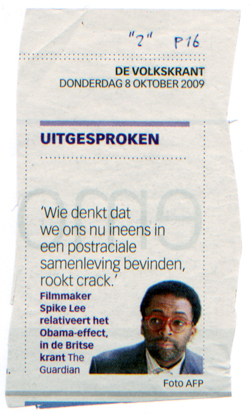Post-racial (–adjective) beyond discussions of race & racism
Word Origin & History: A term used to describe a society or time period in which discussions around race and racism have been deemed no longer relevant to current social dynamics. Popularized after the election of Barack Obama to the presidency of the United States of America in 2009.
urbandictionary.com
“…post-racialism in its current iteration is a twenty-first century ideology that reflects a belief that due to the significant racial progress that has been made, the state need not engage in race-based decision-making or adopt race-based remedies, and that civil society should eschew race as a central organizing principle of social action. Post-racial logic calls instead for a “retreat from race”.” (Cho, p. 1589)
According to Cho the retreat manifests itself in three variaties: 1. Material, 2. Sociocultural and 3. Political.
- Material: state retreats from racial remedies, e.g. affirmative action, race-based admission
- Sociocultural: society trancended the racial moment. ‘race does not matter, and should not be taken into account’. Thus leads to reject any point-out to racial inequities ->unfairly “pulling the race-card”. whiteness is restored to its full pre-civil-rights value.
- Political: reinstallment of white normativity redefining the terms for racial politics. Not only are racial remedies and racial discourse off the table, but so are acts of collective political organization and resistance by racialized individuals. Gone are the “old school” civil-rights leaders whose organizing toolkit included explicit racial discourse and analysis, race-based demands and remedies, and race-based political mobilization.
The ‘retreat from race’ has four key features:
- Racial progress or transcendence racial thinking and racial solutions are no longer needed because the nation has “made great strides,” achieved an historic accomplishment, or transcended racial divisions of past generations.
- Race neutral universalism We must not advocate for race-based policies or remedies, which is partial and divisive.
- Moral equivalence Because post-racialism refers to the racialisms of the pre-civil-rights and civil-rights eras, it is a decidedly twenty-first-century ideology. Post-racialism views both the pre-civil-rights era (from European contact up to the mid-twentieth century) and the civil-rights era (from the mid- to late twentieth century) as racially polarizing. Instead, post-racialism idealizes a society in which race is no longer a basis for differential treatment, grievance, or remedy.
- Political distancing In distinguishing from civil-rights advocates and critical-race theorists lies with a release from the strictures of old-school racism, new-school or colorblind racism, and new-school political correctness and racial obsession.
Professor Cho has 4 points that argue that post-racialism is a dangerous ideology.
- Post-racialism hides the central position that race and racism take on in contemporary society
- Post-racialism argues that since the racial eras are behind us, we should be able to transcend and, therefore, we do not need race-based remedies anymore
- Post-racialism serves to reinstate an unchallenged white normativity
- Post-racialism denigrates collective Black political organization.
Sumi Cho, Post-Racialism (Iowa Law Review, 2009).
“”Post-racial” has been a particularly trendy concept since the US first elected a Black president in 2008. However, the US is by no means a post-racial (and thus post-racist) society; consider for example the recent police killings of unarmed Black youth in Ferguson, Missouri and Los Angeles. For another example of history repeating itself, this time in the Dutch context, see the arguments on an epistemic level for perpetuating the ubiquitous blackfaced folklore character Zwarte Piet (Black Pete) as part of the popular annual celebration of St.Nicolas.” (Adusei-Poku, 2014 p.10)






